Marty
Robbins

-
Inducted1982
-
Born
September 26, 1925
-
Died
December 8, 1982
-
Birthplace
near Glendale, Arizona
Marty Robbins was country music’s Renaissance man: a successful recording artist, songwriter, stage performer, actor, author, and stock car racer. His versatile baritone enabled him to handle a wide variety of musical styles, making him one of the more successful crossover artists during the 1950s and 1960s. Throughout his career, he recorded country, western, rockabilly, Hawaiian, gospel, and pop music, with his specialty being country-pop ballads.
Early Life and Career
Martin David Robinson and his twin sister, Mamie, were born into a poverty-stricken family in Arizona, and his childhood was difficult. He dropped out of school in his teens, served in the U.S. Navy during from 1943 to 1945, and saw action in the Pacific Theater during World War II.
Robbins started his career in 1947 and soon landed his own radio and television shows on KPHO in Phoenix. His break came in 1951 when Little Jimmy Dickens made a guest appearance on Robbins’s TV show. Dickens was so impressed with Robbins that he encouraged his record company to give Robbins a contract. Robbins signed with Columbia Records that year and remained with the label throughout his career, except for the period 1972–1974, when he recorded for Decca/MCA Records.
Robbins joined the Grand Ole Opry on January 19, 1953, and moved to Nashville. In 1965, he started performing on the last segment of the Opry so he could race at the Nashville Speedway. During the summer of 1968 he left a race before it ended in order to make his show, only to find that the Opry was running late, and he might lose some of his time onstage. That night, he not only remained onstage for his assigned time slot, but he stayed beyond it. That act of defiance delighted the audience and became a regular occurrence whenever he appeared; thus, an enduring Opry tradition was born. Often, he would gesture toward the stage manager to signal that he would sing one more song, only to repeat the process for more than an hour, thus cutting into Ernest Tubb’s Midnite Jamboree.
Songs
00:00 / 00:00
00:00 / 00:00
00:00 / 00:00
“El Paso” and Other Hits
Over the course of his career, Robbins had a total of ninety-four records on the country charts, with sixteen reaching the #1 position. In 1955, he charted with rockabilly songs and began to establish his crossover capability. In 1956, Robbins’s recording of Melvin Endsley’s “Singing the Blues” hit #1 on Billboard’s country chart and climbed into the Top Twenty on the pop chart. His crossover success continued with a series of hits he recorded with the Ray Conniff Singers, in 1957 and 1958, aimed at the teen pop market. Among them was “A White Sport Coat (and a Pink Carnation),” which became his biggest hit. Other songs from those sessions included “Just Married,” “The Story of My Life,” and “The Hanging Tree.” The year 1957 also saw the release of the first of several of his Hawaiian music albums, Song of the Islands.
Robbins’s strongest love was for the music and lore of the Old West. When he was a child, his grandfather “Texas Bob” Heckle told him stories of the Old West, and Robbins’s musical hero was Gene Autry. Robbins won a Grammy for what became his signature song, the self-penned “El Paso,” a 1958–1960 hit that topped both the country and the pop charts. Robbins’s 1959 album, Gunfighter Ballads and Trail Songs, eventually sold more than one million copies. Other western albums followed, and he even wrote a western novel, The Small Man.
Robbins also excelled as a songwriter. In 1952, he signed a songwriting contract with Acuff-Rose Publications and, in later years, established his own music publishing company. In addition to “El Paso,” several of Robbins’s other hits were self-penned, including: “A White Sport Coat (and a Pink Carnation),” “You Gave Me a Mountain,” and “My Woman, My Woman, My Wife.” In 1976, he released the album El Paso City, whose self-penned title track became a chart-topping hit.
Videos
“I Couldn’t Keep from Crying”
The Country Show, 1958
“My Blue Heaven”
Marty Robbins’ Spotlight, 1977
Marty Robbins’s versatile baritone enabled him to handle a wide variety of musical styles, making him one of the more successful crossover artists during the 1950s and 1960s.
Photos
-
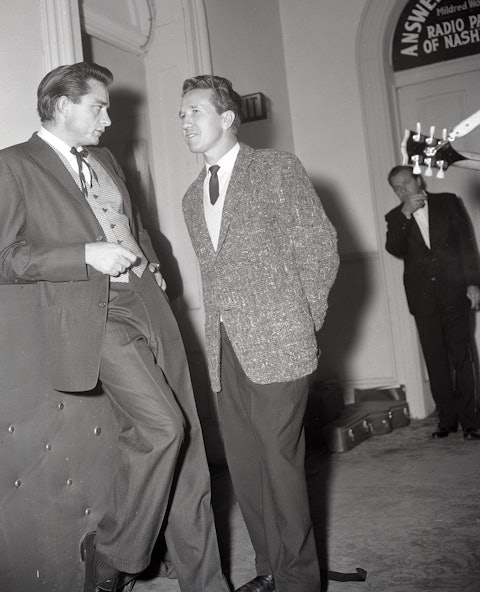
Marty Robbins (right) and Johnny Cash, probably at a function held during the DJ Convention, 1956. Photo by Elmer Williams.
-
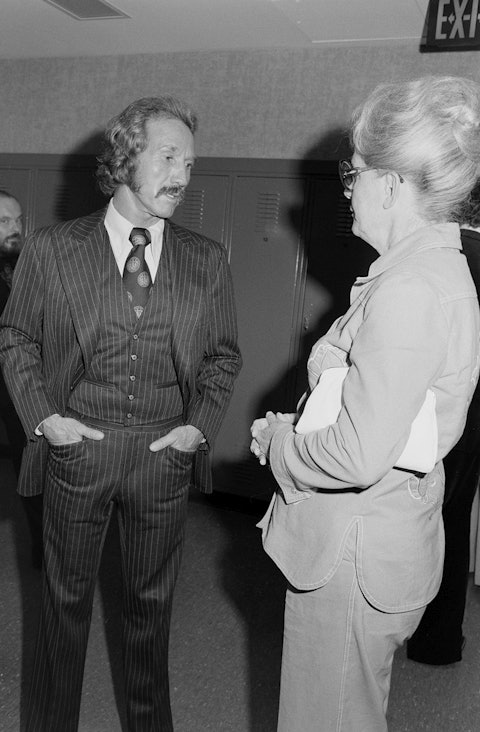
Marty Robbins and Minnie Pearl backstage at the 1976 Country Music Association Awards, in Nashville, Tennessee. Photo by Raeanne Rubenstein.
-
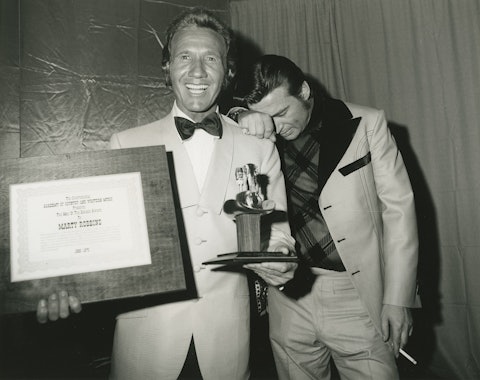
Marty Robbins (left) and Waylon Jennings at the 1970 Academy of Country and Western Music Awards. Robbins is holding his Man of the Decade award plaque, as well as a trophy. Photo by Jasper Dailey.
-
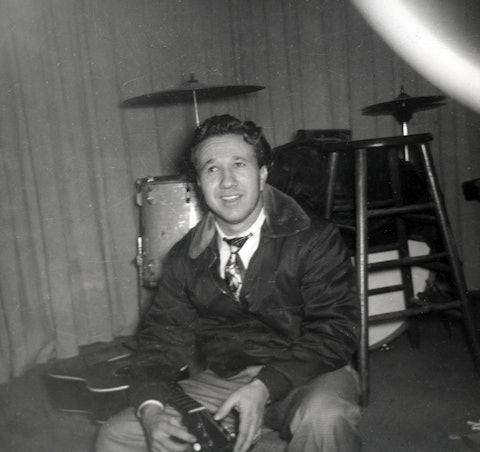
Marty Robbins at Jim Beck’s Studio in Dallas, Texas, c. 1960s.
-
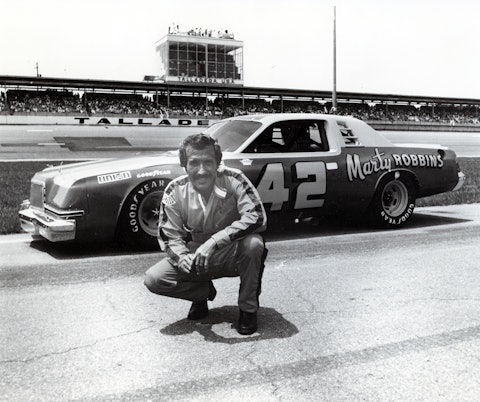
Marty Robbins posing in front of his NASCAR race car at the Talladega Speedway in Alabama, c. 1970s.
-
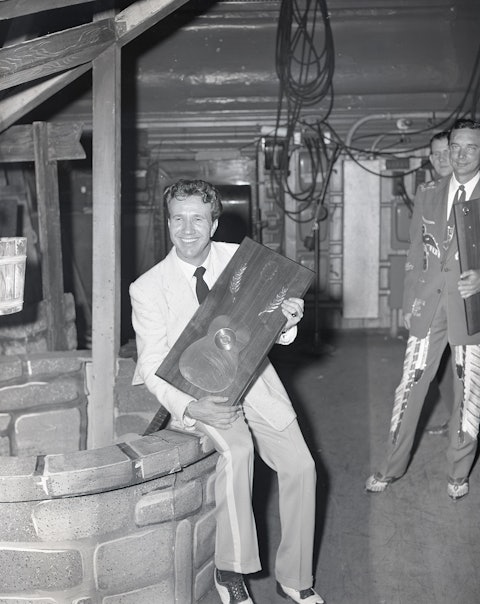
Marty Robbins holding his Columbia Records’ Gold Guitar award for outstanding sales, 1957. Ray Price stands on the right. Photo by Elmer Williams.
-
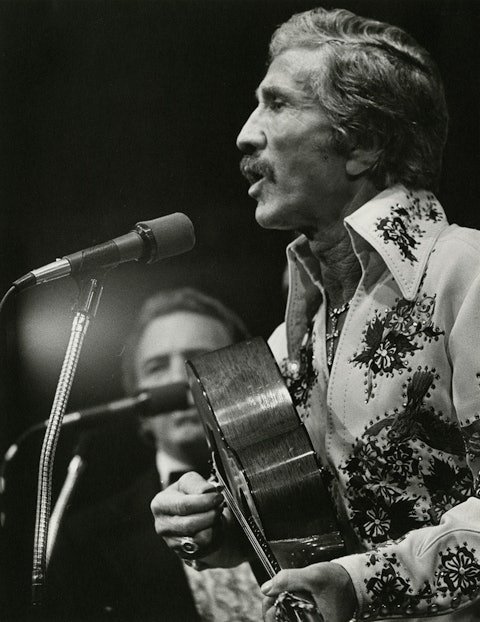
Marty Robbins, dressed in a Nudie-style suit with embroidery and rhinestones, performing onstage, c. 1970s. Photo by Andy Hanson.
-
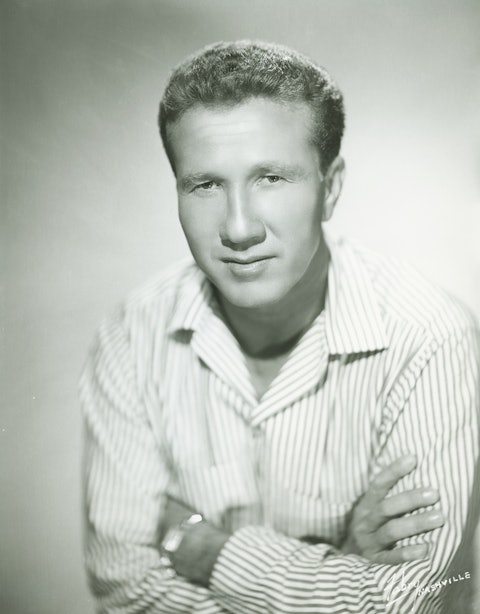
Publicity photo of Marty Robbins, c. 1960s. Photo by Walden S. Fabry.
-
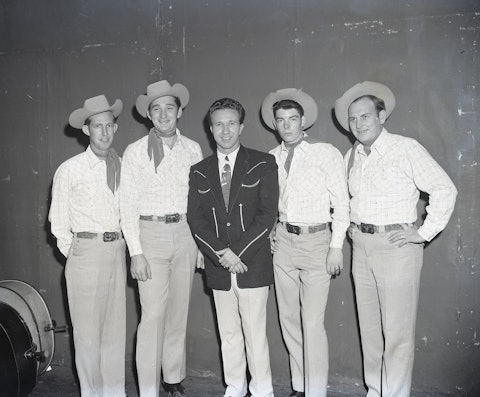
Marty Robbins and his band, c. 1950s. Photo by Elmer Williams.
-
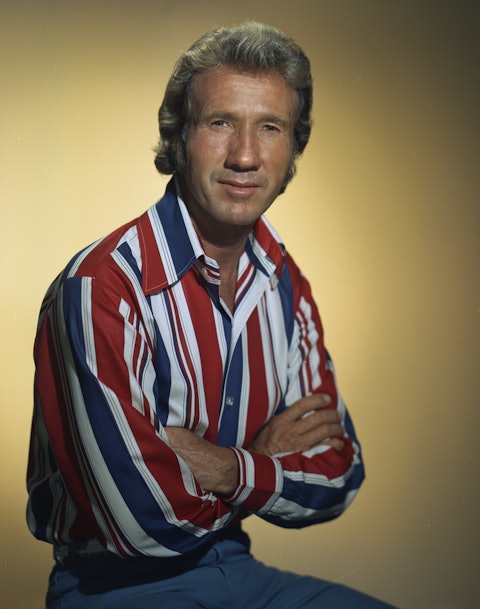
Studio portrait of Marty Robbins, 1970. Photo by Walden S. Fabry Studios.
Racing, Acting, and Later Life
In August 1969, Robbins suffered a heart attack and, on January 27, 1970, underwent bypass surgery, then still in the experimental stages. The operation was a success, and he recovered quickly. Three months later, he received the Academy of Country Music’s Man of the Decade award. In 1971, he received his second Grammy, for “My Woman, My Woman, My Wife.”
Stock car racing played an important part in Robbins’s life. In the 1950s, Robbins was racing micro-midgets. By the 1960s, he was racing modified stock cars at the Nashville Speedway, and in 1966, he entered his first NASCAR Grand National stock car race. Following his heart attack, Robbins returned to NASCAR racing in October 1970. He gave up racing briefly, though, after suffering three wrecks in 1974 and 1975. His love for the sport was so strong that he returned to it in 1977 and continued racing as late as November 1982, a month before his death.
Robbins starred in several films and TV series. Beginning in the 1950s, he made more than a dozen films with western or country music themes. His TV series included Western Caravan (early 1950s), The Drifter (1965), The Marty Robbins Show (1969), and Marty Robbins Spotlight (1977–’78).
The last year of Robbins’s life was climactic. In May 1982, “Some Memories Just Won’t Die” became a Top Ten country hit, and in October, Billboard recognized his renewed success by awarding him its Artist Resurgence Award as the performer who had seen the greatest career revival during the past year. That same month, Robbins was inducted into the Country Music Hall of Fame. He died from a heart attack eight weeks later, on December 8, 1982, at age fifty-seven.
—Barbara Pruett
Adapted from the Country Music Hall of Fame® and Museum’s Encyclopedia of Country Music, published by Oxford University Press



